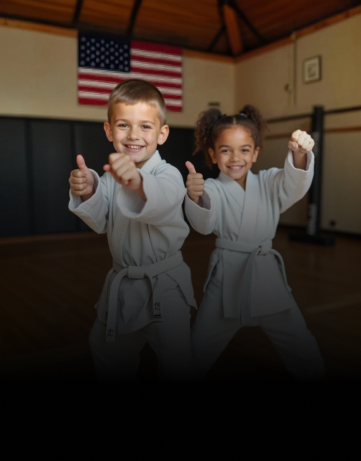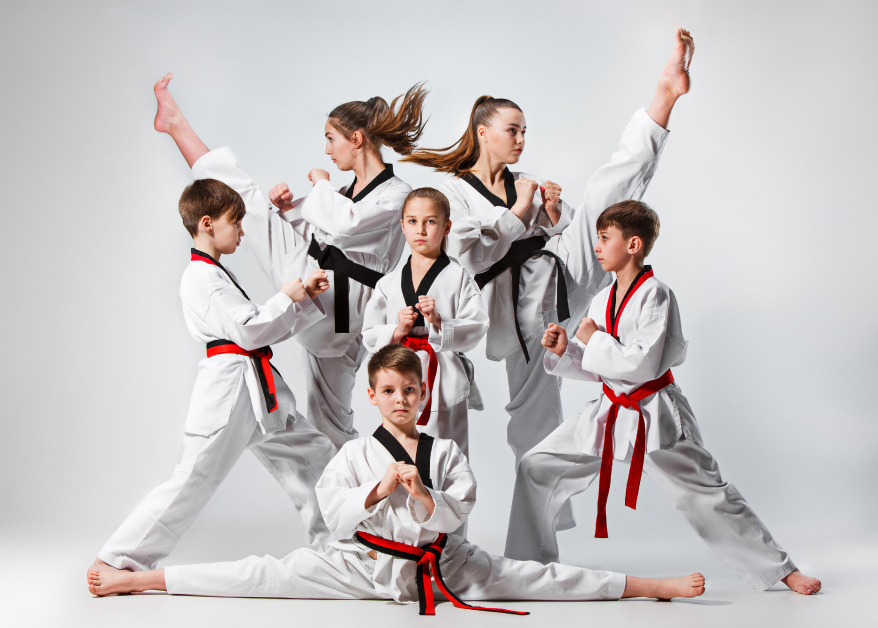Best Martial Arts for Families – Learn, Improve, and Train as a Family Unit
Best Martial Arts for Families – Learn, Improve, and Train as a Family Unit
Blog Article
Exactly How Karate for Children Can Boost Confidence and Technique in Young Martial Artists
Karate for youngsters provides a special chance to develop self-confidence and technique in young martial artists. As they learn new methods and face difficulties, they not only acquire abilities but also create a solid feeling of self-regard. This structured setting encourages them to respect the trip of improvement. However just how does this training translate into their everyday lives? Discover the deeper links that make karate even more than just a sport.
The Importance of Confidence in Childhood Development
Confidence is an essential foundation in youth advancement. When you nurture your child's self-worth, you encourage them to encounter difficulties, take threats, and reveal themselves openly. Youngsters with self-confidence are a lot more prepared to discover social circumstances and new tasks, which can result in long-term relationships and important experiences.Encouraging your child to get out of their convenience area cultivates durability. They learn that failing isn't the end but instead a stepping rock to success. By commemorating their success, no matter just how little, you aid them identify their capacities and worth.In this journey, support and positive reinforcement from you play an essential duty. Whether it's with praise or simply existing, your participation enhances their confidence. As they grow, this self-assurance comes to be a long-lasting property, outfitting them to navigate both obstacles and chances with a strong feeling of self.
How Karate Instructs Discipline and Focus
Karate helps you construct discipline and emphasis with its organized training program. As you practice mindfulness throughout each session, you'll discover to focus much better both on and off the floor covering. Plus, establishing and achieving goals in martial arts enhances your capacity to stay dedicated and mindful.
Structured Training Routine
While you participate in karate training, you'll quickly uncover just how a structured program instills self-control and focus in young practitioners. Each course adheres to a certain format, including warm-ups, method practice, and sparring. This consistency teaches you to dedicate and appreciate the process to improvement. As you learn types and methods, you develop a feeling of duty for your very own progress.The organized setting encourages you to set goals, whether understanding a new belt or improving a kata. You'll find that staying concentrated throughout drills and classes sharpens your focus. The self-control you cultivate in martial arts prolongs past the dojo, favorably affecting your schoolwork and everyday routines. Each session strengthens the importance of devotion, aiding you grow right into a more regimented person.
Mindfulness in Technique
As you exercise martial arts, you'll discover that mindfulness comes to be an important part of your training. Each step requires your full attention, aiding you remain concentrated on today moment. You'll find out to ignore diversions and focus on your breathing, motions, and intents. This enhanced recognition develops your reflexes and enhances your discipline.During sparring or types, you'll uncover the relevance of being emotionally existing - Karate Salisbury MD. You'll discover just how this focus not just enhances your method however additionally develops your self-confidence. By exercising mindfulness in karate, you grow patience and strength, important traits that expand beyond the dojo. This way, martial arts instructs you to harness your mind, aiding you develop a regimented approach to difficulties both on and off the mat

Personal Goal Setting Techniques
Setting goals in karate isn't simply regarding gaining belts; it's an effective means to grow technique and emphasis. When you establish particular, attainable targets, you create a roadmap for your progress. Rather of simply aiming to improve your kicks, try concentrating on mastering a specific strategy each month. This strategy keeps you motivated and engaged.Breaking down bigger goals into smaller sized, workable actions aids you track your progress and celebrate small victories in the process. Whether it's refining your stance or increasing your sparring endurance, every goal strengthens your commitment. As you attain these goals, you'll develop self-confidence in your abilities and establish a solid feeling of discipline that expands beyond the dojo into daily life.
Building Durability With Martial Arts
Fighting style, especially martial arts, uses children a distinct possibility to construct durability in a helpful atmosphere. In classes, they deal with obstacles that press their restrictions, whether it's understanding a new technique or sparring with a partner. Each setback, like a missed kick or a lost suit, comes to be a possibility to find out and grow.As they practice, kids learn to accept pain and keep attempting, also when things get tough. They find that failure isn't the end; it becomes part of the journey. This frame of mind helps them recover stronger, not just in the dojo, yet in daily life.With each challenge they get over, your kid constructs self-confidence in their capacity to deal with barriers, fueling their determination. Through martial arts, they'll comprehend that durability isn't nearly physical toughness; it has to do with psychological grit and willpower, encouraging them to deal with whatever life throws their way.
The Function of Regard in Martial Arts Educating
Regard is a foundational concept in karate training, cultivating a culture of self-control and sociability amongst students. When you step onto the dojo flooring, you're not just finding out methods; you're also discovering to value your trainers, peers, and the art itself (Karate Salisbury MD). Bowing at the beginning and end of course isn't just a rule; it symbolizes your recommendation of others' dedication.as and efforts you create mutual respect, you'll locate it enhances your learning experience. You'll listen more attentively to your instructor and gain insights from fellow trainees. This atmosphere motivates useful objection and support, enabling everyone to expand together.Moreover, regard grows self-control. Acknowledging the worth of effort and humility helps you stay concentrated on your training. Consequently, this regard equates into your daily life, boosting your communications and connections outside the dojo. Via karate, you discover that regard is vital for personal development and area building
Setting Objectives and Attaining Success in Karate

Social Abilities and Synergy in the Dojo
While training in the dojo, children naturally develop essential social skills and teamwork capabilities. As they exercise along with peers, they learn to communicate effectively, share space, and assistance one an additional. Each course provides chances for partnership, whether it's throughout companion drills or group workouts. This team effort fosters relationships and produces a feeling of belonging, making the dojo a nurturing environment.Kids additionally acquire important dispute resolution abilities. When they experience difficulties, such as differences during sparring, they find out to browse these circumstances constructively. They practice perseverance and compassion, recognizing that everybody has various toughness and weaknesses.Moreover, joining group activities grows a sense of liability. You'll see your kid discovering to rely upon teammates and take duty for their role in a group. These experiences not only improve their fighting styles journey yet also outfit them with social tools they'll lug into various other areas of life.

The Long-Term Advantages of Karate Beyond Childhood
As children mature and move into adulthood, the advantages of martial arts extend much past the dojo. You'll discover that the self-control and emphasis learned with karate can equate right into your academic and expert life. Establishing and accomplishing goals in martial arts cultivates a strong job ethic, which can press you to succeed in any endeavor.Moreover, the self-confidence gained from grasping techniques and competing can enhance your self-confidence, assisting you tackle challenges head-on. This resilience comes to be vital as you encounter the uncertainties of adulthood.Additionally, the social skills created via synergy and friendship in the dojo can bring about far better relationships in both expert and individual rounds. You'll discover to communicate efficiently, willpower disputes, and construct a supportive network.Ultimately, karate shapes not just competent martial artists, however well-shaped individuals all set to handle the world.
Regularly Asked Concerns
What Age Is Ideal to Begin Martial Arts for Kids?
You can start martial arts as early as age 4 or 5, but it often depends upon your child's maturation and rate of interest. Finding a course that matches their age and power degree makes a huge distinction.
Are There Any Type Of Health And Wellness Advantages From Exercising Karate?
Yes, exercising karate deals countless health and wellness benefits. You'll enhance your strength, flexibility, and control while enhancing cardio fitness. Plus, it boosts focus and mental health, making it a great selection for general physical and psychological wellness.
Just How Typically Should Kids Attend Martial Arts Courses?
You must encourage your youngsters to participate in karate classes a minimum of two to 3 times a week. Uniformity helps them learn strategies successfully and establish abilities, making their experience much more gratifying and delightful in the future.
Can Karate Aid With Taking Care Of Anxiety in Children?
Yes, martial arts can assist manage stress and anxiety in kids. It educates focus and self-control while offering a risk-free electrical outlet for energy. You'll observe your kid expanding extra confident and tranquil as they practice regularly.
What Equipment Is Needed for Kids Beginning Martial Arts?

Report this page